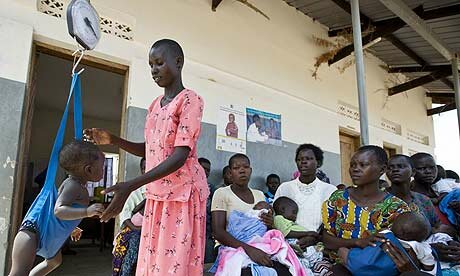Abolishing user fees - does the reality match up to the dream?
 Photo Credit Dan Chung/Guardian |
As orignially seen at The Guardian.
A series of papers published this week attempts to take a measured look at what happens to the poor, when healthcare fees are abolished in sub-Saharan Africa.
Ending the fees that poor people have to pay to get treatment for illnesses would seem to be both morally right and practically sound. Gordon Brown, as UK prime minister, championed the end of user fees in 2009, proudly announcing ahead of a New York summit that four countries would scrap them – Nepal, Sierra Leone, Malawi and Burundi.
But a review published this week by experts from the Institute of Tropical Medicine in Antwerp, sponsored by Unicef which originally commissioned some of the work, suggests that the switch to free healthcare just is not that simple. Most importantly, countries that take that road need help and financial support if an idealistic idea is not to end in the suffering of sick adults and children – as the drugs run out in clinics that no longer have a reliable income stream from patients. And yet, they say, "in 2011, some donors pulled out of countries after having encouraged them to remove user fees in the first place."
The review, published as a supplement in the Oxford University Press journal Health Policy and Planning, says "policies aiming to reduce financial barriers can be very effective in improving health service utilisation, provided they are well designed, funded and implemented." But they "cannot be removed with the stroke of a pen".
Unfortunately, that is exactly what has sometimes happened. Presidents, sensing a popular mood and maybe with a vote coming up, make a big announcement. And then the ministry of health has to catch up. "Electoral considerations have played a role," say health economist Bruno Meessen and colleagues in a paper looking at what happened in six countries. "For instance, in Uganda the decision was taken during the presidential election campaign under pressure of opposition candidates. In Burundi, Liberia and Uganda, the decision to remove user fees was taken by the president, sometimes in a sudden and top-down manner."
Finish reading this blog at The Guardian.
Keyword Search
MLI works with ministries of health to advance country ownership and leadership. This blog covers issues affecting the ministries and the people they serve.
Connect with Us
![]()
![]()
Categories
Blogs We Like
- Africa Can End Poverty
- Africa Governance Initiative
- Behind the Numbers
- CapacityPlus
- Center for Global Health R&D Policy Assessment
- Center for Global Development: Global Health Policy
- Center for Health Market Innovations
- Global Health
- Global Health Hub
- Global Health Impact
- The New Security Beat
- PAI Blog
- RH Reality Check
- Save the Children
- Transparency and Accountability Program
Contact Us
Please direct all inquiries to
